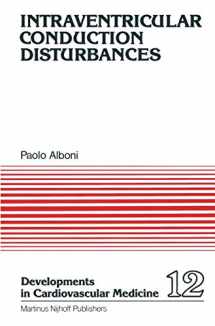
Intraventricular Conduction Disturbances (Developments in Cardiovascular Medicine, 12)
ISBN-13:
9789400982895
ISBN-10:
9400982895
Edition:
Softcover reprint of the original 1st ed. 1981
Author:
A. Alboni
Publication date:
2011
Publisher:
Springer
Format:
Paperback
409 pages
FREE US shipping
Book details
ISBN-13:
9789400982895
ISBN-10:
9400982895
Edition:
Softcover reprint of the original 1st ed. 1981
Author:
A. Alboni
Publication date:
2011
Publisher:
Springer
Format:
Paperback
409 pages
Summary
Intraventricular Conduction Disturbances (Developments in Cardiovascular Medicine, 12) (ISBN-13: 9789400982895 and ISBN-10: 9400982895), written by authors
A. Alboni, was published by Springer in 2011.
With an overall rating of 3.8 stars, it's a notable title among other
books. You can easily purchase or rent Intraventricular Conduction Disturbances (Developments in Cardiovascular Medicine, 12) (Paperback) from BooksRun,
along with many other new and used
books
and textbooks.
And, if you're looking to sell your copy, our current buyback offer is $0.3.
Description
Rhythm was the first expression of cardiac activity which fell under man's obser vation, and the heart beat has always represented the very essence of life itself as it accelerates or slows during moments of rest, effort, joy and pain until it comes to a halt at the moment of death. Undoubtedly the heart beat was, for a considerable time, the only semiological element by which man could interpret the dysfunctions of the organism. Even after thousands of years, research into the alterations of cardiac rhythm still holds a certain fascination, although modern methods and sophisticated devices have changed the approach to such studies. Only about ten years ago, the in terpretation of arrhythmias was obtained by a standard electrocardiogram to which experimental findings on animals were still arbitrarily applied. On the other hand, the achievement of diagnostic decisions was of little importance outside the sphere of pure intellectual speculation since valid therapeutical treatments were lacking. At present, by means of electrophysiological investigations, one can verify and check 'in situ' the different forms and mechanisms through which rhythm and conduction disorders are manifested. Thus, achieving such a methodology which may be defined as a 'functional biopsy', we are allowed to put forward more accurate therapeutic indications now available using both pharmacological and electrical treatment.


We would LOVE it if you could help us and other readers by reviewing the book
Book review

Congratulations! We have received your book review.
{user}
{createdAt}
by {truncated_author}


